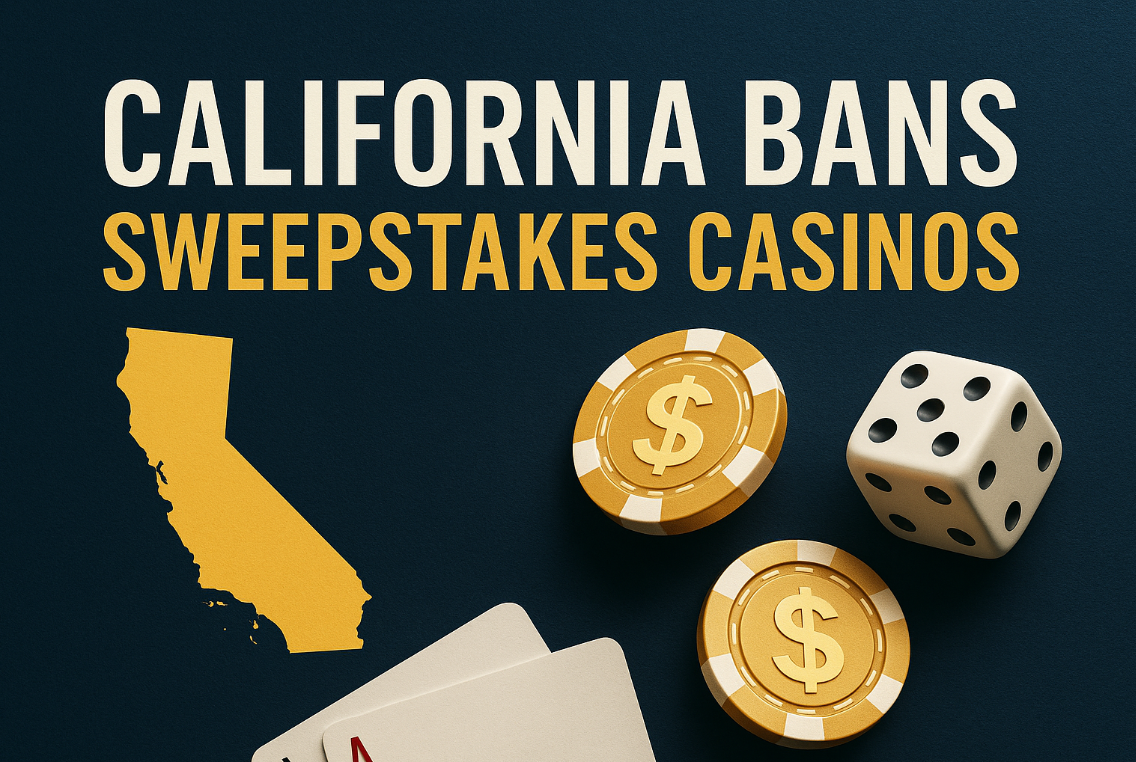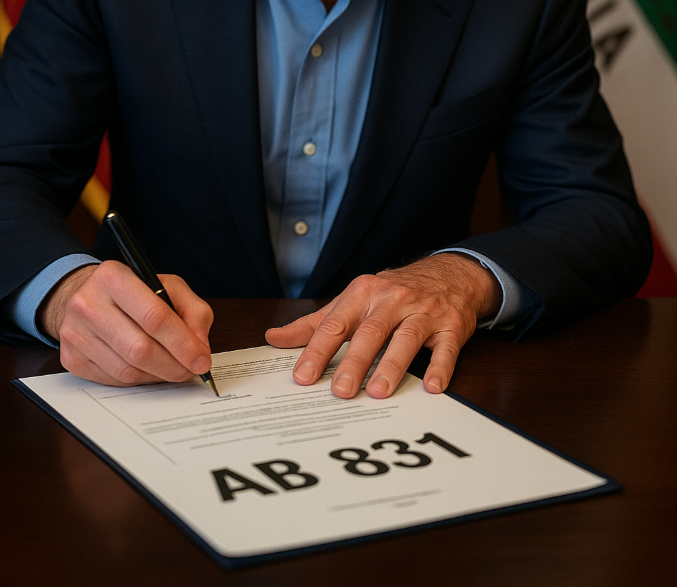January 1, 2026. Operators and vendors that knowingly support dual-currency sweepstakes after that date risk criminal penalties.
Dates, Details, and What Comes Next for the $4B Sweeps Industry
California has outlawed online sweepstakes casinos after Governor Gavin Newsom signed AB 831 into law in October 2025. The statute targets dual-currency “social casino” models and extends liability to vendors that knowingly support them. The prohibition takes effect January 1, 2026, closing a long-contested gray area in state law.

Table of Contents
- What AB 831 Actually Bans
- How the Dual-Currency Model Works (and Why It’s Targeted)
- Market Impact: How Big Is the Hit?
- What Players and Operators Should Expect
- Beyond California: States Moving, Stalling, or Enforcing
- The Economics: How Big Is California’s Slice?
- Bottom Line
- Quick FAQ
What AB 831 Actually Bans
AB 831 defines an “online sweepstakes game” as an internet or mobile offering that simulates casino-style play, uses a dual-currency system (e.g., play coins plus redeemable sweeps currency), and offers cash or cash-equivalent prizes. Operating such games in California becomes a crime; knowingly supportive third parties—including content suppliers, platform providers, geolocation firms, payment processors, and affiliates—can also be held liable. Penalties include fines up to $25,000 and/or up to one year in county jail.
Effective date: The ban is set to begin on January 1, 2026.
Why California did it: Tribal gaming groups and consumer protection advocates argued that dual-currency sweepstakes infringe on tribal exclusivity and blur the line between promotions and unregulated gambling. The bill cleared the Legislature with unanimous Senate support before landing on the Governor’s desk.

How the Dual-Currency Model Works (and Why It’s Targeted)
Most sweepstakes casinos use two balances: a play-only coin with no cash value, and a sweeps coin that can be redeemed for cash if terms are met. Players often receive “free” sweeps coins alongside purchases of play coins or through mail-in entries, daily logins, or promotions. California’s lawmakers concluded this structure effectively mimics gambling while skirting licensing rules.
Market Impact: How Big Is the Hit?
Independent analysts revised 2025 net revenue estimates for U.S. sweepstakes casinos from ~$4.7B down to about $4B amid mounting regulatory pressure. California represents an outsized slice of the pie—roughly 17%–20% of U.S. sales and around $790M in annual net revenue, per recent forecasts—so a statewide ban is material.
Supplier behavior is already shifting. In early September 2025, Pragmatic Play said it would cease supplying games to U.S. sweepstakes operators, a move widely linked to heightened scrutiny and litigation.
What Players and Operators Should Expect
- California access ends for dual-currency sweepstakes sites on Jan 1, 2026. Many platforms have already begun geoblocking California users and processing withdrawals for affected accounts.
- Vendor compliance will matter: payment processors, game studios, platform tech, geolocation providers, and affiliates face exposure if they knowingly support violations. Expect conservative risk policies and broader cutoffs.
- No change to real-money iGaming in CA: AB 831 reinforces prohibitions; it does not legalize online casinos or sports betting.
Beyond California: States Moving, Stalling, or Enforcing
States that enacted bans in 2025
- Montana — First mover in 2025. SB 555 outlaws online gambling played for any form of currency. Chapter Number Assigned (on 05/16/2025)
- Connecticut — SB 1235 passed with overwhelming votes; sweepstakes casinos prohibited. Last action: House, Jun 24, 2025: Signed by the Governor
- New Jersey — Gov. Phil Murphy signed A5447/S4282 on Aug 15, 2025, banning the sweepstakes wagering model and empowering the DGE and Consumer Affairs to enforce.
States taking other aggressive steps
- New York — The Attorney General ordered sweepstakes operators to stop serving NY; separate legislation to ban the model advanced in 2025.
- Nevada — Lawmakers advanced measures to penalize illegal sweepstakes; industry exits followed amid SB 256’s enforcement posture.
Where bans stalled or split opinion
Several states explored prohibitions in 2025 but did not pass final bans, or pursued narrower enforcement actions instead. Outcomes varied based on tribal interests, consumer protection priorities, and debates over scope and definitions.
The Economics: How Big Is California’s Slice?
Analysts estimate California accounts for about 17.3% of U.S. sweepstakes sales—roughly $2.4B in 2025 sales and around $790M in net revenue. AB 831’s go-live date will likely push operators and vendors to exit or firewall the state, removing one of the industry’s largest markets.
Industry studies suggest 2025 net revenue will land near $4B nationally—down from earlier ~$4.7B projections—largely due to state-level crackdowns, vendor withdrawals, and increased litigation risk.
Bottom Line
California’s AB 831 is a watershed moment. The law codifies a bright-line test against dual-currency social casinos, adds liability for knowing vendors, and goes live on January 1, 2026. With other states passing bans or stepping up enforcement, the U.S. sweepstakes casino model faces a more fragmented map, higher compliance costs, and reduced supplier participation. Expect geoblocking, accelerated withdrawals for Californians, and a broader pivot to risk-averse operations across the sector.
Quick FAQ
Featured Articles
Browse through our other articles












